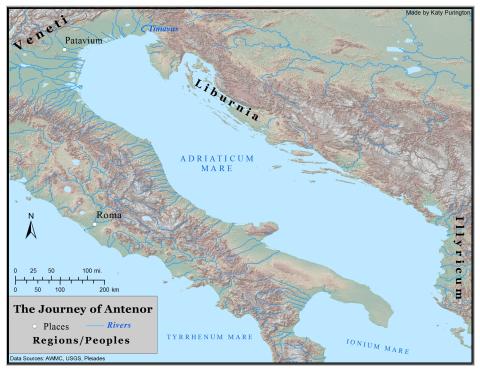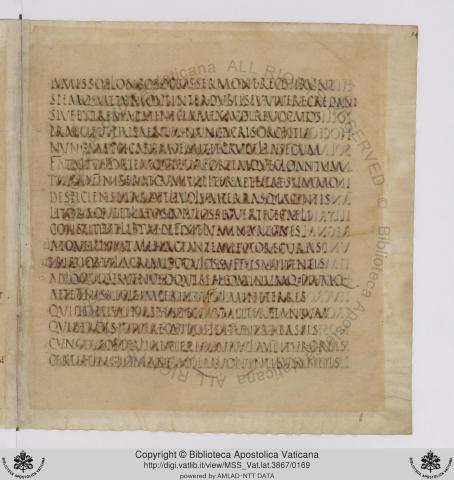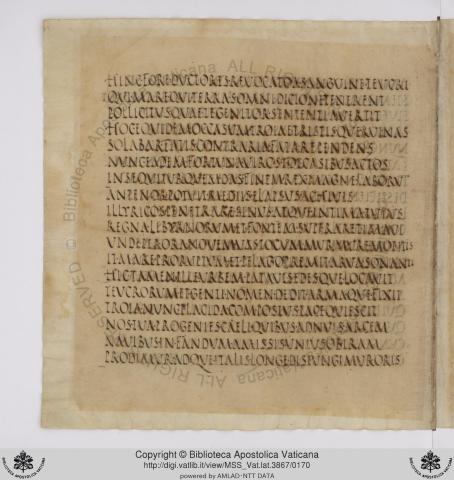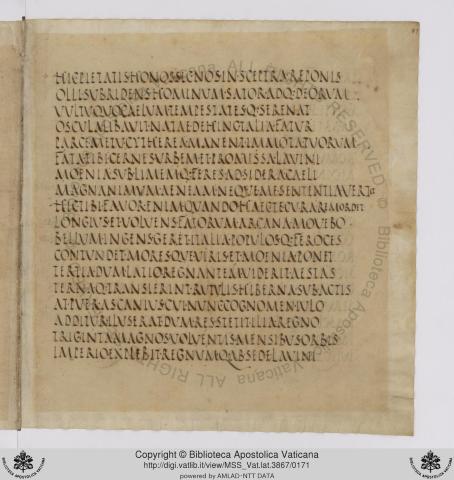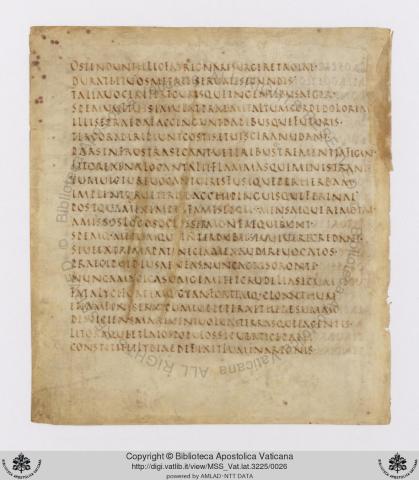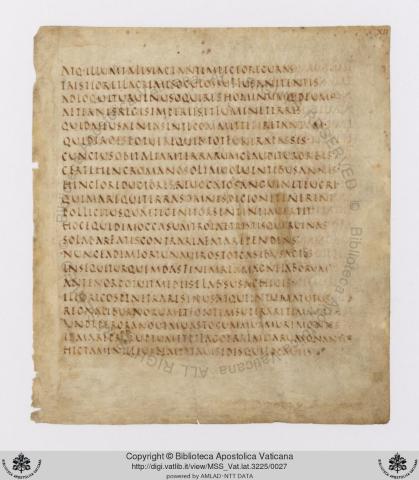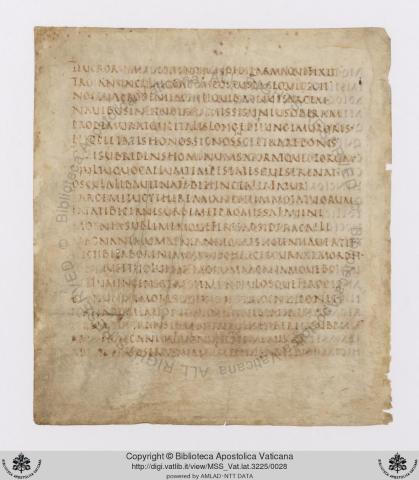Et iam fīnis erat, cum Iuppiter aethere summō
dēspiciēns mare vēlivolum terrāsque iacentēs
lītoraque et lātōs populōs, sīc vertice caelī225
cōnstitit et Libyae dēfīxit lūmina rēgnīs.
Atque illum tālēs iactantem pectore cūrās
trīstior et lacrimīs oculōs suffūsa nitentēs
adloquitur Venus: 'Ō quī rēs hominumque deumque
aeternīs regis imperiīs et fulmine terrēs,230
quid meus Aenēās in tē committere tantum,
quid Trōës potuēre, quibus tot fūnera passīs
cūnctus ob Ītaliam terrārum clauditur orbis?
Certē hinc Rōmānōs ōlim volventibus annīs,
hinc fore ductōrēs, revocātō ā sanguine Teucrī,235
quī mare, quī terrās omnēs diciōne tenērent,
pollicitus—quae tē, genitor, sententia vertit?
Hōc equidem occāsum Trōiae trīstēsque ruīnās
sōlābar fātīs contrāria fāta rependēns;
nunc eadem fortūna virōs tot cāsibus āctōs240
īnsequitur. Quem dās fīnem, rēx magne, labōrum?
Antēnor potuit mediīs ēlāpsus Achīvīs
Īllyricōs penetrāre sinūs atque intima tūtus
rēgna Liburnōrum et fontem superāre Timāvī,
unde per ōra novem vāstō cum murmure montis245
it mare prōruptum et pelagō premit arva sonantī.
Hīc tamen ille urbem Patavī sēdēsque locāvit
Teucrōrum et gentī nōmen dedit armaque fīxit
Trōïa, nunc placidā compostus pāce quiēscit:
nōs, tua prōgeniēs, caelī quibus adnuis arcem,250
nāvibus (īnfandum!) āmissīs ūnīus ob īram
prōdimur atque Italīs longē disiungimur ōrīs.
Hic pietātis honōs? Sīc nōs in scēptra repōnis?'
notes
Manuscripts: M 223-233, 234-253 | R 223-234, 235-252, 253 | F 223-226, 227-247, 248-253
Venus comes to Iuppiter, as he surveys the world, imploring him, in tears, to end Aeneas’ sufferings and to allow him to reach Italy (Austin).
223: finis erat: “all was ended,” viz. their mourning (F-B). aethere summo: “from the summit of the sky,” or Olympus (F-B). “from the height of heaven” (Walpole).
224: velivolum: “sail-winged” (F-B). iacentes: “spread out”; as they would appear when seen from a great height above (Frieze).
225: latos populos: “the outstretched nations” (Anthon). latos: = late habitantes (Frieze). sic: i.e., sic despiciens (F-B). vertice caeli: “on heaven’s height” (F-B). Poet. local abl. (Sidgwick) (AG 429.4).
226: regnis: either dative or ablative (Frieze). Ablative of place (F-B). Dat. = in regna (Page).
227: atque illum…: when a sentence is thus introduced by the strong connecting particle atque, the event described in it is very closely connected (here in time) with the preceding sentence (Page). tales...curas: “meditating upon such cares”; such, namely, as are occasioned by the present condition of Aeneas, in Libya, to which especially Jupiter has turned his attention, while he stands “on the summit of heaven” (Frieze).
228: tristior: “somewhat sad,” an unusual condition for the laughter-loving goddess (F-B). “With unwonted sadness.” She was known as the smiling goddess (Frieze). She had been tristis since the period of the downfall of Troy; she was now tristior at the idea of the perils that encompassed her son (Anthon). oculos suffusa: “her eyes filled (with tears).” The accusative is really the direct object of the passive participle, which is used with a middle or reflexive force, a construction strongly influenced by Greek usage (F-B). The accusative of synecdoche, or “Greek accusative,” limiting suffusa; literally: “suffused as to her eyes” (Frieze) (AG 397b).
231: quid tantum: “what great offence” (F-B). Aeneas: sc. potuit, from potuere (F-B). in: “against” (Walpole). tantum: should strictly be followed by quibus…claudatur = ut eis claudatur “so great that all the world is barred to them,” but the indicative is more vivid and definite (Page).
232: quibus: dative of disadvantage, with clauditur (F-B) (AG 376). funera: “disasters” (F-B), signifies here not only death, but other great calamities (Frieze).
233: ob Italiam: “because of Italy,” i.e., because Juno is trying to keep them from Italy (F-B). clauditur: because Juno desires to keep them away from Italy, and so prevent the founding of the Roman empire, she is striving to render the whole world, or every shore, inaccessible to them, and thus bring about their destruction (Frieze).
234: hinc: “from these,” i.e., Aeneas and the Trojans (F-B). olim volventibus annis: “some day, as the years rolled on” (F-B). volventibus: intrans. (Sidgwick), supply se.
235: fore: = orituros esse (Frieze), indirect discourse, dependent on pollicitus (es) (Carter). revocato a sanguine Teucri: added to explain hinc. Teucer was the first king of Troy, and his line is to be restored (F-B). The allusion is to Teucer, father-in-law of Dardanus, and king over part of Phrygia. He was regarded as one of the founders of the Trojan race (Anthon).
236: omni dicione: “with full power” (Walpole). tenerent: subjunctive in a subordinate clause in indirect discourse, dependent on fore (Carter), represents the future indicative of direct narration (F-B) (AG 484b).
237: pollicitus: sc. es (F-B). sententia: “purpose” (F-B). quae te sententia vertit: Vergilian inversion for cur sententiam vertisti? (Walpole).
238: hoc: sc. promisso (Walpole). “With this promise” (F-B), ablative of means (Carter). equidem: “to be sure” (F-B). hoc equidem occasum…: we have here a poetical construction, by which, instead of the accusative of the person (solabar me), we have the accusative of the evil itself on account of which consolation is needed (Anthon).
239: solabar: “I sought comfort for.” solari is poetical for consolari (F-B). = consolabar (Carter). fatis contraria fata rependens: literally, “with fates balancing (offsetting) hostile fates.” fatis: not dative, but ablative of instrument, fatis means the happier future promised; fata, the past misfortunes (F-B). sc. melioribus (Walpole), ablative of price. Supply melioribus, or aliis (Frieze).
240: nunc: “but now”; effective asyndeton (F-B). emphatic: “even now,” i.e., when we had a right to look for better fortunes (Frieze). eadem fortuna: “the same ill-luck” (Carter).
242: Antenor: see map. The legend was that Antenor the Trojan escaping led a colony of Trojans and Eneti or Heneti (from Asia Minor) to the north end of the Adriatic, where they settled under the name of Veneti, which still survives (Sidgwick). Antenor was a Trojan prince related to Priam; he was suspected of holding a secret correspondence with the Greeks. He was in favour of making peace with them and restoring Helen. After the fall of Troy he went to Italy, and there founded Patavium (Padua) (Robertson).
243: Illyricos sinus: “Illyrian gulfs,” i.e., the Adriatic along the shores of Illyricum. Its navigation is troublesome (F-B). Illyricum was the country on the east coast of the Adriatic (Sidgwick). intima: i.e., lying far up the Adriatic, for Antenor would not go inland (Walpole). tutus: “safe,” notwithstanding the warlike character of the Illyrians and the Liburni, and the dangers of the navigation (Frieze). Opposed to tot casibus actos (Walpole).
244: Liburnorum: a savage people, living in Illyricum (F-B). superare: “to pass” (F-B). Timavi: the small river Timavus flows into the Adriatic near Trieste (F-B).
245: unde: = a quo fonte (F-B). i.e., from the river (Walpole). per ora novem: i.e., the springs where the subterranean stream reappears (F-B). vasto cum murmure montis: i.e., from the reverberation of the waters in the caverns (Frieze).
247: hic: i.e., in this region (Walpole). tamen: i.e., in spite of these difficulties (Walpole). urbem Patavi: i.e., Padua, some twenty miles west of Venice. The genitive is appositional (F-B) (AG 343d).
248: nomen: the people were called Veneti, (hence Venice), but the name here alluded to is probably Trojan, inasmuch as Livy says that the pagus Troianus was so called because Troia was the place where Antenor first landed (F-B). arma...fixit: i.e., he dedicated his arms in a temple, a sign that his warfare was over, and he could live in peace (F-B). In token of gratitude he fastened his arms to the wall or door-posts of the temple of his patron deity (Frieze). As a sign that warfare was over (Walpole).
249: nunc...quiescit: “settled in tranquil peace he enjoys rest.” The words are used, not of the peace of death, but of rest from toil and danger (F-B). compostus: a syncopated form of compositus (F-B).
250: nos: “but we,” effective asyndeton...the words being strongly contrasted with Antenor, 242. Venus identifies herself with Aeneas (F-B). Expresses the maternal feelings of Venus, which makes the interest of Aeneas her own (Frieze). caeli...arcem: “the heights of heaven,” i.e., immortality (F-B). Aeneas was supposed not to have died but to have been taken up to heaven, where he became one of the Di Indigetes “native gods”— benefactors of the human race like Hercules and Romulus who were deified for their merits (Page) (Smith’s Dictionary, s.v. Indiges). adnuis: “promise,” lit. “nod to”: the acc. is due to the secondary sense, “promise” (Sidgwick). The word involves a reference to the solemn nod of assent, with which Jupiter could shake Olympus (F-B).
251: infandum: an accusative of exclamation (F-B) (AG 397d). Parenthetic and exclamatory (Walpole). “Oh! woe unutterable!” Infandum here and elsewhere alludes to that, the full extent or measure of which cannot be expressed in words (Anthon). unius: Juno (F-B).
252: prodimur: this word casts reproach, by implication, upon Jupiter himself, and is justified by the heavy grievances of which she complains (Frieze).
253: hic: for hoc, but attracted by the predicate noun, honos (F-B). honos: “reward” (F-B), “recompense” (Anthon). sceptra: the symbol of power, instead of imperium (Frieze). reponis: Venus was to be compensated for the fall of her kingdom of Troy, by being given another kingdom. Notice that the prefix re- here expresses the notion of duty or propriety (Carter).
vocabulary
Iuppiter, Iovis, m.: Jupiter, son of Saturn and Rhea, and king of the gods, 1.223; Iuppiter Stygius, Pluto, 4.638.
dēspiciō, spexī, spectus, 3, a.: to look down upon, 1.224; despise, reject, 4.36. (dē and speciō, look)
vēlivolus, a, um: adj. (vēlum and volō), sail-flying, sail-covered, 1.224.
vertex, icis, m.: a whirl; whirlpool, 7.567; vortex, 1.117; whirling column of flame, 12.673; the top, crown of the head, the head, 1.403; summit, top, 1.163; mountain summit, height, 3.679; ā vertice, from on high, from above, 1.114. (vertō)
Libya, ae, f.: Libya; northern Africa; by poetic license, Africa, 1.22, et al.
dēfīgō, fīxī, fīxus, 3, a.: to fasten or fix down or in; the object on or in which, in the dat., or in the abl., with or without a prep.; fix, direct, 1.226; p., dēfīxus, downcast, 6.156.
iactō, āvī, ātus, 1, freq. a.: to throw often or much; toss to and fro; toss, freq.; hurl, cast, 2.459; thrust out, 5.376; aim, 5.433; (fig.), throw out words, utter, say, 1.102; of the mind, revolve, meditate, 1.227; sē iactāre, boast, exalt one's self, rejoice, glory, 1.140; prae sē iactāre, to make pretense of, 9.134; p., iactāns, antis, arrogant, assuming, ambitious, 6.815. (iaciō)
suffundō, fūdī, fūsus, 3, a.: to pour from below; pour through; overspread, suffuse, 1.228. (sub and fundō)
nitēns, entis: shining, glittering, sparkling; bright, 1.228; (fig.), sleek, well-fed, 3.20.
adloquor, locūtus sum, 3, dep. a.: to address, 1, 229.
Venus, eris, f.: Venus, goddess of love and beauty, identified by the Romans with Aphrodite, daughter of Jupiter and Dione, 1.411, et al.; (meton.), love, lust, 6.26.
ō: (interj. expressing joy, grief, astonishment, desire, or indignation), O! oh! ah! w. voc., 2.281, et al.; w. sī and the subj., oh that, 11.415; sometimes placed after the word to which it relates, 2.281.
fulmen, inis, n.: lightning, 10.177; thunderbolt, 2.649, et al.; thunder, 1.230. (fulgeō)
Aenēās, ae, m.: 1. A Trojan chief, son of Venus and Anchises, and hero of the Aeneid, 1.92. 2. Aenēās Silvius, one of the Alban kings, 6.769.
Trōes, m.: (subst.), the Trojans, 1.30, et al. (Tros, one of the kings of Troy)
possum, potuī, posse, irreg. n.: to be able; can, 1.242, et al.; to avail, have influence, power, 4.382. (potis and sum)
Ītalia, ae (Ī by poetic (epic) license), f.: Italy, 1.2, et al.
Rōmānus, ī, m.: a Roman, 1.234.
volvō, volvī, volūtus, 3, a.: to roll, 1.86; roll along or down, 1.101; roll or cast up, 3.206; toss, hurl, 12.906; roll over, roll in the dust, 12.329; cast, hurl down, 1.116; 9.512; roll, wheel, 1.163; of books, open, unroll, 1.262; of the Fates, fix the circle of events, decree, ordain, dispose, 1.22; 3.376; of the mind, revolve, meditate, reflect upon, 1.305; pass, continue, live through, experience, endure, suffer, 1.9; rotam volvere, to complete a cycle, period; (pass.), volvī, roll over, roll, 10.590; turn or wind about, 7.350; to be shed, to flow, 4.449; roll on, revolve, 1.269.
ductor, ōris, m.: a leader, 1.189; captain, commander, 5.133; prince, king, 9.691. (dūcō)
Teucer (Teucrus), crī, m.: 1. Teucer, first king of Troy, son of the river-god Scamander, and father-in-law of Dardanus, 1.235. 2. Teucer, son of Telamon and Hesione, half-brother of Ajax, and founder of Salamis in Cyprus, 1.619.
diciō, ōnis, f.: dominion, power, sway, rule, 1.622. (only in gen., dat., acc., and abl. sing.)
polliceor, licitus sum, 2, dep. a.: to promise, 1.237.
genitor, ōris, m.: he who begets; father, sire, 1.155, et al. (gignō)
equidem: (adv.), indeed, at least, certainly, surely; w. first person, for my part, 1.238. (demonstr. e or ec and quidem)
occāsus, ūs, m.: a going down; setting; the west, 11.317; fall, ruin, destruction, 1.238. (1. occidō)
Trōia, ae, f.: 1. Troy, the capital of the Troad, 2.625, et al. 2. A city built by Helenus in Epirus, 3.349. 3. A part of the city of Acesta in Sicily, 5.756. 4. The name of an equestrian game of Roman boys, 5.602.
ruīna, ae, f.: a falling down; fall, overthrow; convulsion, commotion, destructive force, 1.129; onset, shock, 11.613; pl., ruin, overthrow, destruction, 1.238; dare, trahere ruīnam, to fall in ruins, 2.310; bring destruction, 12.454. (ruō)
sōlor, ātus sum, 1, dep. a.: to solace, console, 5.770; assuage, comfort, aid, relieve, 5.41; console one's self for, 1.239.
contrārius, a, um: adj. (contrā), opposite; (fig.), contrary, opposed, opposing, 2.39; unfavorable, adverse, 1.239; subst., contrāria, ōrum, n. pl., opposite things, different counsels, 12.487.
rependō, pendī, pēnsus, 3, a.: to weigh again or in return; to compensate for, balance, 1.239; repay, requite, return, 2.161.
īnsequor, secūtus sum, 3, dep. a.: to follow up, pursue, follow, 5.321; press on, follow up; succeed, 1.87; persecute, pursue, 1.241; w. inf., proceed, 3.32.
Antēnor, oris, m.: Antenor, a Trojan prince, nephew of Priam, who fled from Troy, and settled in northern Italy at Patavium, shortly before the arrival of Aeneas in Latium, 1.242.
ēlābor, lāpsus sum, 3, dep. n.: to slip or glide forth or away; escape from, 1.242; spring aside, dodge, 5.445.
Achīvī, ōrum or um: the Greeks, the Achaeans 2.102.
Īllyricus, a, um: adj. (Īllyria), pertaining to Illyria, the country north of Epirus; Illyrian, 1.243.
penetrō, āvī, ātus, 1, a. and n.: to penetrate, reach, 1.243; attain to, go as far as, penetrate to, 7.207. (rel. to penitus)
interior, ius: (adj.), inner, interior; interior or inner part of, 1.637; on the inner side, 5.170; superl., intimus, a, um, innermost, 1.243. (compar. of obs. interus, rel. to inter)
Liburnī, ōrum, m.: the Liburni or Liburnians, a warlike people, inhabiting Liburnia, near the head of the Adriatic Sea on the Illyrian coast, 1.244.
Timāvus, ī, m.: the Timavus, a river at the head of the Adriatic, northwest of Trieste, 1.244, et al.
novem: (num. adj., indecl.), nine, 1.245.
vāstus, a, um: (adj.), empty, void, wild, waste, 9.323; vast, unbounded, 1.118; huge, enormous, immense, 3.647; deep-, vast-, sounding, 1.245.
murmur, uris, n.: a murmur, 6.709; uproar, 1.124; roaring, reverberation, 1.55; acclamation, applause, 5.369; thunder, 4.160.
prōrumpō, rūpī, ruptus, 3, a. and n.: to cause to burst forth; cast forth, 3.572; spring forth, 10.796; rush, run, burst into, 7.32; p., prōruptus, a, um, breaking, starting out, 7.459; dashing, rushing, broken, 1.246.
pelagus, ī, n.: the sea; open sea, main, 1.138; flood, 1.246.
sonāns, antis: sounding, resounding, murmuring, rustling, rattling, freq. (sonō)
Patavium, iī, n.: Patavium, now Padua, an ancient town in northern Italy, 1.247.
locō, āvī, ātus, 1, a.: to place, put, 1.213, et al.; lay, 1.428; found, 1.247. (locus)
Teucrī, ōrum, m.: the Trojans, descendants of Teucer, 1.38, et al.; adj., Teucrian, Trojan, 9.779, et al. (Teucer)
fīgō, fīxī, fīxus, 3, a.: to fix or fasten; freq., the object in or on which, in the abl., 1.212; abl. w. prep., 6.636; acc. w. prep., 9.408; fasten up, suspend from, 3.287; hang up, 1.248; set up, establish, make, 6.622; transfix, pierce, 5.516; hurl (fix by hurling), 10.883; wound, 10.343; inscribe, 11.84.
Trōius, a, um: (adj.), of Troy, Trojan, 1.119.
placidus, a, um: adj. (placeō), gentle, calm, tranquil, peaceful, serene, 5.848; inactive, idle, 9.187; friendly, propitious, 3.266; (adv.), placidē, gently, softly, quietly, calmly, 5.86.
prōgeniēs, ēī, f.: lineage, progeny, race, 1.19; offspring, 5.565; son, 7.97. (prōgignō)
adnuō, nuī (ūtus, rare), 3, a. and n.: to nod to; with dat., acc. and dat., and infin.; ascent, consent, 4.128; promise, 1.250; direct, permit, 11.20.
īnfandus, a, um: (adj.), not to be uttered; unutterable, inexpressible, unspeakable, 4.85; cruel, 1.525; dreadful, horrible, 10.673; accursed, perfidious, 4.613; fatal, 2.132; neut., in exclamations, īnfandum! O shame, O woe unutterable! 1.251; pl., īnfanda, as(adv.), 8.489.
Italus, a, um: Italian, 3.440, et al.; subst., Italī, ōrum, m., the Italians, 1.109. (Ītalia)
disiungō, iūnxī, iūnctus, 3, a.: to disjoin, separate, drive away from, 1.252.
ōra, ae, f.: a margin, border, 12.924; coast, shore, 3.396; region, 2.91; rim, extremity, 10.477; pl., outline, compass, 9.528.
scēptrum, ī, n.: a royal staff; scepter, 1.653; freq.; (meton.), rule, sway, power, royal court, realm, 9.9; 1.253; authority, 11.238.
repōnō, posuī, positus (postus), 3, a.: to lay, place, put back, replace, 3.231; lay aside or down, 5.484; put, lay up, store away, w. abl., 4.403; lay, deposit, place, 6.220; w. dat., 11.594; restore, w. in and acc., 1.253; return, repay, 12.878.

